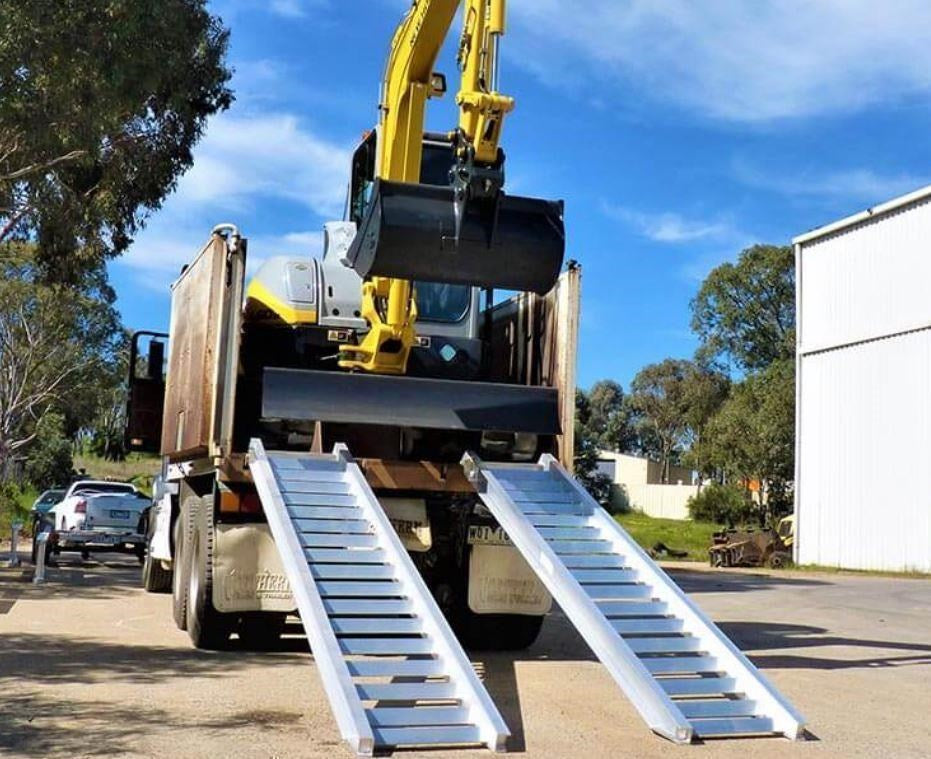How to Choose the Right Loading Ramps for Your Earthmoving Combo
If your business requires loading earthmoving on and off a truck, selecting the right loading ramps is crucial for your safety, and your profitability!
It’s about safety, efficiency, and getting the job done right. Nobody wants to see their people or equipment damaged, and you can’t invoice if the digger is stuck on the truck waiting for new ramps to arrive! So, let’s dive into what you need to consider when choosing the best loading ramps for your fleet.
Understanding Your Machinery
First things first, know your gear inside out. The weight, height, and width of your earthmoving equipment are the key factors in choosing a ramp. You don’t want a ramp that’s too small for your heaviest excavator or too narrow for your widest loader.
Loading Ramp Length and Height
The height of your truck bed and the length of the ramp work together to ensure a safe incline. Use a simple formula: taller trucks need longer ramps. A gentle slope means safer loading and unloading, reducing the risk of tipping or accidents.
All of our ramps come with a maximum loading height, so measure the height of your truck bed and make sure it’s below the maximum loading height of ramps you choose
Loading Ramp Weight Capacity
This one’s a no-brainer, but crucial and often misunderstood. Your ramps must handle the weight of your machinery plus any additional attachments. Always factor in a safety margin above your heaviest machine’s weight to ensure durability and safety.
Just because your excavator has 1.7t written on the side of it, doesn’t mean you can go ahead and use a set of 1.8t ramps.
The manufacturer doesn’t always calculate all of the extra weight we add to machines such as canopies, large attachments, fluids and the weight of the operator - these can really start to add up!
Give yourself a safety margin. We like to add atleast 20% to the weight of the machine - so you’re 1.7t excavator probably requires 2 tonne ramps.
Ramp loading capacities also assume the weight is evenly distributed, so if you’re likely to have more weight on one of the ramps (e.g loading sideways) you may need to go for an even higher load rating
Loading Ramp Width and Stability
Width is vital for stability. Ensure the ramps are wider than the machinery's tracks or tires. Stability also depends on the ramp surface. Look for ramps with non-slip surfaces and side rails for added security.
As with everything when it comes to safety, give yourself a margin for error and make sure you have more than a few mm either side of the tracks or tyres!
Loading Ramp Materials Matter
Most ramps are made from aluminium or steel. Aluminium is lightweight and corrosion-resistant, perfect for frequent use. Steel ramps are heavier but can handle more weight, ideal for larger machines.
Aluminium loading ramps provide the best of both worlds - they are far lighter than steel ramps, making them much easier to move. All of our aluminium loading ramps are made from marine grade aluminium, which means you can leave them in the back of the truck and not worry about rust!
Loading Ramp Portability and Storage
Consider how you'll transport and store your ramps. Make sure you measure your truck bed to confirm the ramps will fit with the tailgate closed.
If you have a lighter machine in a trailer, folding ramps could be a great option!
Choosing the right loading ramps for your earthmoving business isn’t just about buying a piece of equipment; it's about investing in the safety and efficiency of your operations. Remember, the right ramp for the job is as important as the machinery itself. Stay safe and keep moving forward!
Need more advice or ready to find the perfect ramp for your fleet? At Ramped Up, we’re here to help, so reach out to our team if you need any help, or see our full range of Aluminium Loading Ramps.

